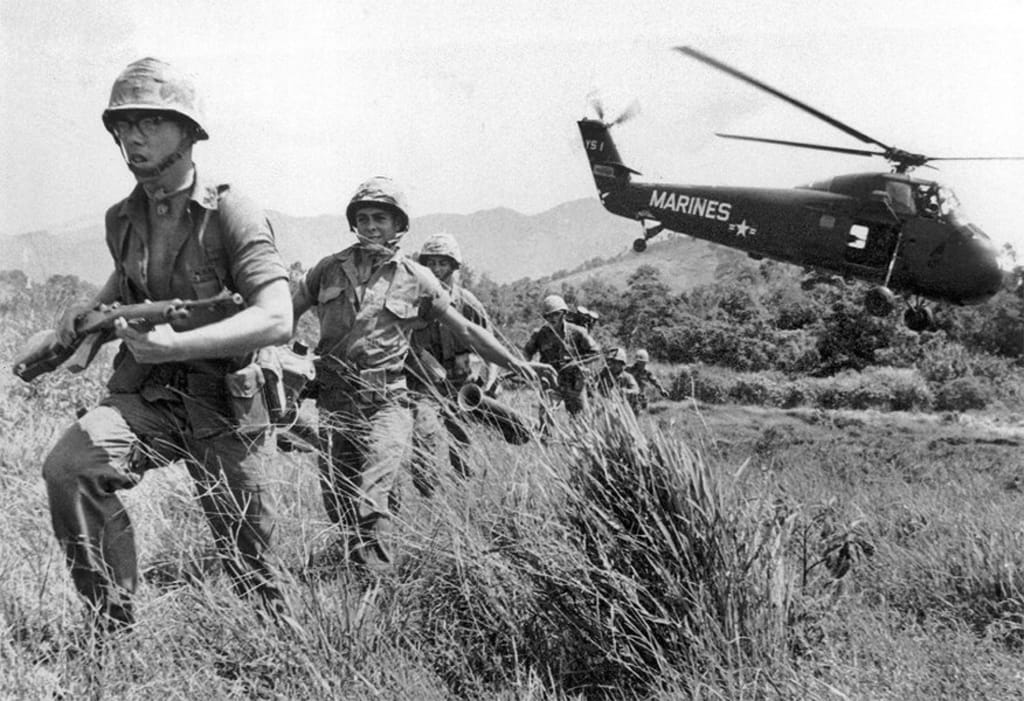The Vietnam War: A Tale of Two Presidents
The War Which Changed the USA

The 1960s and 1970s were turbulent decades for US politics. In a little over 10 years, America went from launching full scale war in Vietnam to gradually pulling out before the one and only case of a US President resigning from office. It changed the way in which America was viewed on the world stage.
The conflict can be viewed as one which showed the arrogance and the ignorance of the American leaders. Once it was over, the Gerald Ford government seemed intent on moving on as soon as possible. For years afterwards, veterans were not properly recognised by the country which had sent them halfway around the world to fight in a war which was never truly justified. America went to war with the aim of stopping communism from spreading. Lyndon Johnson started with this idea and he passed the baton to Richard Nixon. The Western power wanted to do good in the east, yet they were swiftly taught a lesson on fighting in a field far more foreign than they were used to.
It was Johnson who gave the go ahead for the USA to enter a full-scale war in Vietnam. The support for the democratic South Vietnamese army had, up until 1965, been mainly in a supportive role. There were many doubters to the USA engaging in the war, even Johnson himself. In May 1964 the President told his National Security advisor McGeorge Bundy, “I don’t think it’s worth fighting for and I don’t think we can get out. It’s just the biggest damned mess.” The man at the top wasn’t convinced the US could win the war, yet still he sent hundreds of thousands of Americans to Southeast Asia.
Johnson made it clear that he didn’t want to run for a second term in 1968. In the space of just over four years, he had gone from throwing masses of US firepower into the war to giving his famous address in March 1968. He used this speech to confirm he wouldn’t be running for the Presidency again in the autumn and that he was going to drastically reduce bombing missions to North Vietnam. He was genuinely fearful for what the war was doing for liberty in his beloved country. The war had taken its toll on Johnson. It threatened to disrupt his legacy, hence why he stepped aside in late 1969.
Lyndon Johnson’s replacement in the White House, Richard Nixon, was elected in the most part for his plan to take the US out of Vietnam. Despite his intentions, it would be another five years before military involvement ceased. Furthermore, a third of all American lives lost in Vietnam were under his Presidency. His war policy was controversial, most significantly the invasion of Laos and Cambodia. It may be vague, but it’s clear to say that this action could have so easily dragged China and/or the Soviet Union into the war. This level of escalation would have been catastrophic for all involved.
Nixon’s "Vietnamisation" plan would shift most of the ground fighting onto the South Vietnamese army (whom he’d made sure were much better trained). This, combined with the removal of the draft selection process, led to a reduction in anti-war protests back home—something which had flourished over the years of bloodshed throughout the 1960s.
The abuse of democratic power carried out by the Nixon government during "Watergate" undermined all plans to bring the war to a close. The scandal, which concluded with Nixon’s resignation, illuminated corruption at the highest level and left the American people questioning their politicians like never before. Had Nixon’s serious crimes gone undiscovered he would have remained President, and the South Vietnamese army would have still received significant US supplies and logistical support meaning that perhaps they would have stood more of a chance in defeating the North. However, history played out the way it did, and newly instated President Gerald Ford didn’t share the ambitions of his predecessor and wanted to see support for South Vietnam reduced.
Vietnam showed that warfare was changing. The USA was sucked into the war to the point where its leaders couldn’t justify pulling out. Even the most ill-informed military leader should have realised the war could not be won by the mid to late 1960s, yet the fighting continued. Was it national pride? After all, the US had turned itself into a military powerhouse. They couldn’t be defeated by a small communist nation, or at least that’s what the consensus was for most of the war. The war between two sides of the same nation brought out the best and worst of American forces in Southeast Asia and their leaders back home in Washington. Yet by the time the war ended in 1975, the thoughts were not of embarrassment, but more of confusion as to how so many soldiers were sent off to fight in such an irrelevant conflict which should have attracted little to no interest from the West.
About the Creator
Enjoyed the story? Support the Creator.
Subscribe for free to receive all their stories in your feed. You could also pledge your support or give them a one-off tip, letting them know you appreciate their work.






Comments
There are no comments for this story
Be the first to respond and start the conversation.